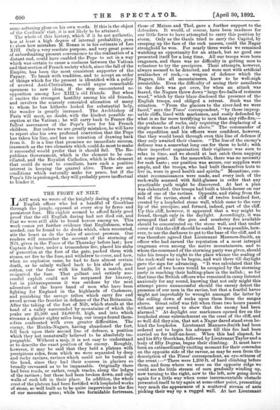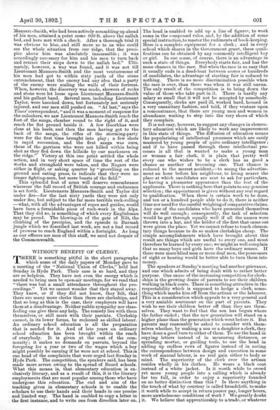THE FIGHT AT NILT.
TAST week we wrote of the knightly daring of a young English officer who led a handful of Goorkhas through the jungle, opposed at every step by fierce and persistent foes. His exploit seemed to afford fairly good proof that the old English daring had not died out, and that we were still able to breed heroes among us. This week comes yet further evidence that Englishmen, when needed, can be found to do deeds which, when recounted, stir the heart as do the tales of ancient prowess. Our needed, can be found to do deeds which, when recounted, stir the heart as do the tales of ancient prowess. Our readers will remember the account of the storming of Nilt, given in the Times of the Thursday before last; how Captain Aylmer, under a tremendous fire, placed his slabs of guncotton at the foot of the gate, packed them with stones, set fire to the fuse, and withdrew to cover, and how, when no explosion came, he had to face almost certain death, as he calmly walked back to his slabs of gun- cotton, cut the fuse with his knife, lit a match, and re-ignited the fuse. That gallant and entirely suc- cessful exploit could not be surpassed for bravery, but in picturesqueness it was outdone by the next adventure of the brave band of men who have been fighting for England in the highlands of Cashmere, and punishing the savage tribes which carry fire and sword across the frontier in defiance of the Pax Britannica. After the taking of the fort of Nilt, which stands at the head of a valley surrounded by mountains of which the peaks are 25,500 and 24,000 ft. high, and into which streams a glacier eighty miles long, our troops found them- selves confronted with even greater difficulties. The enemy, the Hunka-Nagars, having abandoned the fort, fell back upon their second line of defence, a position which they not unnaturally believed to be absolutely im- pregnable. Without a map, it is not easy to understand or to describe the exact position of the enemy. Roughly, however, it may be said that they held a plateau with precipitous sides, from which we were separated by deep and rocky ravines, ravines which could not be turned at the head, since they had their sources in glaciers so broadly crevassed as to be impassable. Originally there had been roads, or rather, rough tracks, along the ledges of the ravines ; but these had been broken down, and only walls of rock left in their place. In addition, the whole crest of the plateau had been fortified with loopholed works of stone, so well built as to be quite impervious to the fire of our mountain guns; while two formidable fortresses, those of Maium and Thol, gave a further support to the defenders. It would, of comae, have been madness for our little force to have attempted to carry this position by storm. Only as the Gauls tried to carry the Capitol, by creeping up the face of the rock unseen, could the Nagar stronghold be won. For nearly three weeks we remained watching an opportunity for an attack, but no good one presented itself for a long time. All our troops were born cragsmen, and there was no difficulty in getting men to volunteer to try the precipices. Their attempts, however, always seemed to be detected, and were met with artificial avalanches of rock,—a weapon of defence which the Nagars, like all mountaineers, knew to be well-nigh irresistible. Even the difficulty of seeing their assailants in the dark was got over, for when an attack was feared, the Nagars threw down " large fire-balls of resinous wood," which by their blaze disclosed the presence of the English troops, and obliged a retreat. Such was the situation. " From the glaciers to the river-bed we were faced," says the Times' correspondent, "by these impreg- nable cliffs, lined with marksmen, and easily defended by what is so far more terrifying to men than any rifle-fire,- the avalanche of rocks, only requiring the displacing of a single stone to start it from above." The commander of the expedition and his officers were confident, however, that they would break through even this line of defence if they only awaited their chance. "The line of the enemy's defence was a somewhat long one for them to hold ; with their imperfect organisation their vigilance was sure to relax in time, and we should at last catch them napping at some point. In the meanwhile, there was no necessity for rash haste ; our position was secure, our supplies were ample, and the troops, who had built themselves huts to live in, were in good health and spirits." Meantime, con- stant reconnaissances were made, and every inch of the rock-walls scanned with field-glasses in order that any practicable path might be discovered. At last a plan was elaborated. Our troops had built a block-house on our side of one of the ravines. Opposite, and rising from the bed of the ravine, stood a cliff of twelve hundred feet, crested by a loopholed stone wall, which came to the very lip of the precipice, and formed, indeed, part of the cliff. Up this cliff, however, it appeared that a way might be found, though only in the daylight. Accordingly, it was arranged that all the gun and musketry fire available should be concentrated on the stone wall, and that under cover of this the cliff should be scaled. It was possible, how- ever, to use the darkness to get to the base of the cliff, and it was therefore agreed that Lieutenant Manners-Smith, an officer who had earned the reputation of a most intrepid cragsman even among the native mountaineers, and to whom the command of the storming party was given, should take his troops by night to the place whence the scaling of the rock-wall was to be begun, and wait there till daylight gave the sign for advancing. "It was calculated that the best part of two hours would be occupied by the storming party in reaching their halting-place in the nallah ; so for that time the British officers who remained in camp listened anxiously for any sound, knowing that not only might this attempt prove unsuccessful should the enemy detect the presence of our men in the ravine, but that a fearful havoc might not improbably be wrought amongst the latter by the rolling down of rocks upon them from the sangas above. Great relief was felt when these two hours passed without any sound to show that the enemy had been alarmed." At daylight our marksmen opened fire on the loopholed stone entrenchment on the crest of the cliff, and so well did they aim, that not a Nagar dared stand even be- hind the loopholes. Lieutenant Manners-Smith had been ordered not to begin his advance till this fire had been carried on for half-an-hour. When this had elapsed, he and his fifty Goorkhas, followed by Lieutenant Taylor and a body of fifty Dogras, began their climbing. It must have been an extraordinarily exciting moment for their comrades on the opposite side of the ravine, as may be seen from the description of the Times' correspondent, an eye-witness of the event :—" There were 1,200 ft. of hard climbing before them, and from where we were on the opposite ridge we could see the little stream of men gradually winding up, now turning to the right, now to the left, now going down again for a little way when some insurmountable obstacle presented itself to try again at some other point, presenting very much the appearance of a scattered stream of ants picking their way up a ragged wall. At last Lieutenant Vannerz-Smith, who had been actively scrambling up ahead of his men, attained a point some 800 ft. above the nallah bed, and here met with a check. After a thorough trial it was obvious to him, and still more so to us who could see the whole situation from our ridge, that the preci- pice above him was absolutely inaccessible ; it was accordingly necessary for him and his men to turn back and retrace their steps down to the nallah bed." Ulti- mately, however, a way was found, and it was not till Lieutenant Manners-Smith and the most venturesome of his men had got to within sixty yards of the stone entrenchment, that the enemy had any idea that a party of the enemy were scaling the walls of their fortress. When, however, the discovery was made, showers of rocks and stone were let loose upon Lieutenant Manners-Smith and his gallant band. Several men, including Lieutenant Taylor. were knocked down, but fortunately not seriously injured, and our men still pushed on. "At last," says the Times' correspondent, "and it was a moment of suspense for the onlookers, we saw Lieutenant Manners-Smith reach the foot of the sanga, clamber round to the right of it, and reach the flat ground beside it. A few Goorkhas were close at his heels, and then the men having got to the back of the sanga, the rifles of the storming-party were for the first time brought into play ; a few shots in rapid succession, and the first sanga, was ours, those of the garrison who were not killed within being shot as they fled down the hillside by our marksmen on the ridge." Victory at this one point settled the whole action, and in very short space of time the rest of the works and stronghold were taken, and the Nagars were either in flight, or asking quarter by " grovelling on the ground and eating grass, to indicate that they were no longer fighting-men, but mere beasts of the field."
This splendid feat of arms will deserve remembrance wherever the full record of British courage and endurance is set forth. Lieutenants Manners-Smith and Taylor did under fire—for the last sixty yards they were not only under fire, but subject to the far more terrible rock-rolling —what, with all the advantages of ropes and guides, would have been a formidable piece of rock-work in the Alps. That they did so, is something of which every Englishman may be proud. The blowing-in of the gate of Nilt, the climbing of the precipice, and the episode in Burmah jungle which we described last week, are not a bad record of prowess to reach England within a fortnight. As long as our officers are men of this stuff, we need not despair of the Commonwealth.



















































 Previous page
Previous page